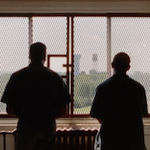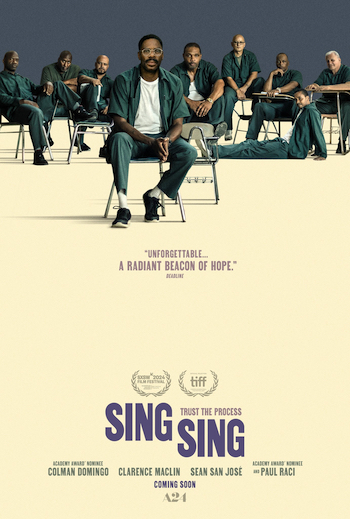 SING SING is an unusual movie with a simple appeal: it’s about a theater program in a prison, and most of the cast is made up of actual graduates of the program playing versions of themselves, so there’s an unmistakable feeling of authenticity completely outside of a normal Hollywood production. We see interjections of unscripted or documentary scenes – auditions, video of real plays – but mostly we just see very natural performances by actors/characters speaking or drawing from their hearts in ways that cut deep.
SING SING is an unusual movie with a simple appeal: it’s about a theater program in a prison, and most of the cast is made up of actual graduates of the program playing versions of themselves, so there’s an unmistakable feeling of authenticity completely outside of a normal Hollywood production. We see interjections of unscripted or documentary scenes – auditions, video of real plays – but mostly we just see very natural performances by actors/characters speaking or drawing from their hearts in ways that cut deep.
One of the familiar actors in the movie is Paul Raci (DRAGON: THE BRUCE LEE STORY) as the director, Brent, a mentor character similar to his Oscar nominated one in SOUND OF METAL. I forgot exactly what Raci’s background was and fell for the illusion that he was pretty much a real guy going into social worker mode. There’s a scene where as an acting exercise they close their eyes and imagine their happiest place, then they go around the circle and describe what they thought about. They’re all talking about their childhood or about being with their kids or about the pain of their lives in isolation. When Brent notes that men don’t usually get to be emotionally vulnerable like this it could be a scripted line, but it doesn’t feel like one, it feels like just honestly running the exercise and appreciating how it goes.
But this is the story of John “Divine G” Whitfield, a founding member and leader of RTA (Rehabilitation Through the Arts), played by a very well known actor, Colman Domingo (MIRACLE AT ST. ANNA, LINCOLN, RED HOOK SUMMER, THE BUTLER, SELMA, IF BEALE STREET COULD TALK, ZOLA, WITHOUT REMORSE, CANDYMAN, TRANSFORMERS: RISE OF THE BEASTS, DRIVE-AWAY DOLLS). He was nominated for a Best Actor Oscar for this and has a more traditionally show-offy performance that dips into lots of big emotion, plus some Shakespeare, but he does a good job of meshing in with the others. Divine G is fresh off a triumphant performance as Macbeth, and he has a typewriter in his cell for writing plays and working on his appeals. He’s so accomplished that when a stranger approaches him in the cafeteria it turns out not to be a threat, it’s just to get one of his books signed. (The fan is played by the real Divine G.)
 What’s unexpected about the character and the way Domingo plays him is that he’s kind of full of shit. Despite the heavy setting, for a while this movie plays pretty comedic. For the next play the group wants something less challenging than Shakespeare, and someone says they should do one of Divine G’s plays. He acts humble for about five second, then launches into a detailed pitch. When the newest member, Divine Eye (Clarence “Divine Eye” Maclin), respectfully asks why they never do comedies, wouldn’t the population like an escape from reality, G says “I don’t write comedies.” Then, “I write satires…”
What’s unexpected about the character and the way Domingo plays him is that he’s kind of full of shit. Despite the heavy setting, for a while this movie plays pretty comedic. For the next play the group wants something less challenging than Shakespeare, and someone says they should do one of Divine G’s plays. He acts humble for about five second, then launches into a detailed pitch. When the newest member, Divine Eye (Clarence “Divine Eye” Maclin), respectfully asks why they never do comedies, wouldn’t the population like an escape from reality, G says “I don’t write comedies.” Then, “I write satires…”
So you’ve got this guy who is hugely admired within his world of the incarcerated, who has done so much for others, and he acts very modest and open to other people’s ideas, but you can see it’s killing him. He was the one who recruited Divine Eye, a menacing bully in the yard who’s reluctant to admit his interest in acting and has a hard time letting his guard down to participate. Divine G sees something in him and tries to inspire him, but then he loses a role to him – Hamlet! – and has to play a silly role as a gladiator.
But the comical aspect melts away as real tension builds between the two and their different attitudes. G is more physically imposing but (like many Domingo characters) his eyes are wildly emotive and empathetic, while Eye’s are cold and hard as steel and mostly communicate that he’s not with this or doesn’t want to be here.
I had heard the hype about Domingo, but not Maclin, who it turns out received a Best Supporting Actor nomination from the BAFTAs. Good for them. Divine Eye’s fight to break out of the captivity of his tough guy exterior is truly harrowing, and the two Divines alternately reaching out to offer help to each other but not knowing how to accept it is the heart of the movie. Also, while it’s cool to see Domingo do his polished, enunciated Shakespeare, it’s way more of a thrill to watch Maclin evolve from just reading the lines out loud to being able to sell them in his own voice.
There are some subplots with normal prison movie material, but just barely. Mostly we exist in this sanctuary of the theater (in a room that looks like it was literally a church), making it all the more blunt when reality hits. We don’t see many prison guards, so when Divine G’s cell gets searched and all his papers are dumped out and mixed up on the floor you see the true indignity of it. Obviously that’s very low on the scale of bad things that prisons do to people, but he shouldn’t be treated like that. Nobody should be treated like that. By keeping most of the dark stuff off screen or understated I think it comes across more powerfully. When SPOILER Divine G gets out at the end we’re so elated along with him, but he looks into the window of the cell next to him and sees a guy who doesn’t look much older than 20. The cycle continues.
Sean San José might have the second most dialogue in the movie, as Divine G’s right hand man Mike Mike, so of course I wondered about his background. He’s had a few bit parts going back to MOBSTERS in 1991, but he’s mainly a theater actor, director and artistic director in the Bay Area, and in fact he founded a performance group for people of color called Campo Santo, so he has real experience running a theater company. (He’s also a creative executive at Domingo’s production company, maybe that’s where their chemistry comes from.)
But any number of real RTA graduates have moments to shine, in particular Sean “Dino” Johnson, when he explains to Divine Eye in very personal terms what a violation it is to keep getting into fights during their rehearsals. The Oscars broadcast transposed a clip of that scene with a page of script, but I would’ve believed it if you told me he improvised it based on personal experience.
Director Greg Kwedar (TRANSPECOS) is credited as screenwriter along with Clint Bentley (they also wrote the movie JOCKEY together, I heard that was good). SING SING was nominated for the Best Adapted Screenplay Oscar, because it’s credited as being based on the Esquire article “Sing Sing Follies (A Maximum-Security Comedy)” by John H. Richardson and the play Breakin’ the Mummy’s Code by Brent Buell. Yes, that’s the silly time travel comedy they’re putting on in the movie, but it’s more than that: according to the article, Breakin’ is “about six convicts who each write separate plays and then splice them together into one ridiculous romp” so it “has lots of play-within-a-play dialogue about prisoners on the stage.”
Divine Eye and his Hamlet monologue are in the article, but not the rest of his arc from the movie, and Divine G is not even mentioned. That explains why the real Divine Eye and Divine G share story credit with Bentley and Kwedar (and therefore are Oscar nominees!).
Of the many fine movies about heavy subjects that I watched in my Oscar-viewing completism this year, SING SING is maybe the easiest to recommend, because of its emphasis on the ol’ human spirit. There are laughs and there is brotherhood and there are human souls being nourished. Without being corny about it, it shows an example of finding peace and joy in the most miserable of situations, of finding a way to continue after you’ve done wrong or been wronged, of people who have spent their lives hiding their humanity deep inside finding ways to let it out. A beautiful prison movie.


























March 13th, 2025 at 2:44 pm
I had a tough time with this, because so much of it was triggering, bringing back the memories of when I did time. I can tell you, the cell raids are common, unannounced, and brutal. Whatever you have (and it’s very little) they will just chuck it on the ground and leave it there. Clothing, personal photos, any creative project, it will end up covered in dirt and footprints. I’ve heard there’s a rule after every search that officers have to put everything back where they found it. I saw hundreds of searches — not once was anything put back in its original location.
It’s completely irrational, but I hated Colman Domingo for this. He gives a great performance, and honestly, truly, I think he’s a hero for being in a movie like this, helping it get made. But the whole time, the movie felt so authentic and I’m just looking at him like he’s such a tourist. I generally am hostile towards these things. Stuff like that show 60 Days In is so, so, so deeply offensive to me.
I don’t put too much weight on the Oscars. But to me, the lack of a Best Picture nomination (as well as the box office gross) is just a reminder that the general public really doesn’t give a damn about people in prison. I hope there are maybe more movies like this so people can stop talking about inmates in prison like they’re in the afterlife.
I wrote a little bit more about this a few months ago, if anyone’s interested in some sort of first-hand perspective on the subjects in this movie. https://fromtheyardtothearthouse.substack.com/p/weekend-special-watching-sing-sing